Another very minimal approach is:
trap 'SECONDS=0' DEBUG
export PS1='your_normal_prompt_here ($SECONDS) # '
This shows the number of seconds since the last simple command was started. The counter is not reset if you simply hit Enter without entering a command -- which can be handy when you just want to see how long the terminal has been up since you last did anything in it. It works fine for me in Red Hat and Ubuntu. It did NOT work for me under Cygwin, but I'm not sure if that's a bug or just a limitation of trying to run Bash under Windows.
One possible drawback to this approach is that you keep resetting SECONDS, but if you truly need to preserve SECONDS as the number of seconds since initial shell invocation, you can create your own variable for the PS1 counter instead of using SECONDS directly. Another possible drawback is that a large seconds value such as "999999" might be be better displayed as days+hours+minutes+seconds, but it's easy to add a simple filter such as:
seconds2days() { # convert integer seconds to Ddays,HH:MM:SS
printf "%ddays,%02d:%02d:%02d" $(((($1/60)/60)/24)) \
$(((($1/60)/60)%24)) $((($1/60)%60)) $(($1%60)) |
sed 's/^1days/1day/;s/^0days,\(00:\)*//;s/^0//' ; }
trap 'SECONDS=0' DEBUG
PS1='other_prompt_stuff_here ($(seconds2days $SECONDS)) # '
This translates "999999" into "11days,13:46:39". The sed at the end changes "1days" to "1day", and trims off empty leading values such as "0days,00:". Adjust to taste.

